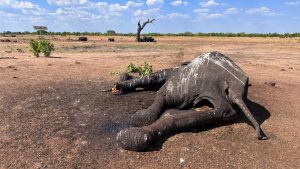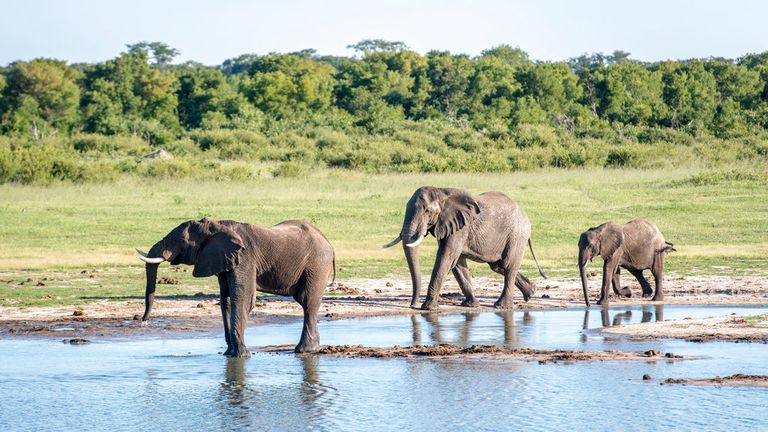The International Fund for Animal Welfare (IFAW) says the elephants died at Hwange National Park due to a lack of water.

At least 100 elephants have died in Zimbabwe’s largest national park amid a drought.
Experts from the International Fund for Animal Welfare (IFAW) say the elephants died at Hwange National Park due to a lack of water.
It has 104 solar-powered boreholes to maintain sources of water for the animals.
However, park authorities say there are not enough and the boreholes are no match for extreme temperatures, which are drying up existing waterholes and forcing wildlife to walk long distances searching for food and water.
The deaths of the elephants are a sign of what wildlife authorities and conservation groups say is the impact of climate change and the El Nino weather phenomenon.
“El Nino is making an already dire situation worse,” according to Mr Farawo.
El Nino is a natural and recurring weather phenomenon that warms parts of the Pacific, affecting weather patterns around the world.
The pattern typically lasts 12 months and peaks in December.
However, studies indicate that climate change may be making El Ninos stronger, leading to more extreme consequences.
While this year’s El Nino has already brought deadly floods to East Africa, it is expected to cause below-average rainfall across southern Africa.
In Zimbabwe, there has been a recent spell of rising heat and a scarcity of rain. And, while some rain has now fallen, the forecasts are generally for a dry, hot summer ahead.
Authorities fear a repeat of 2019 – another El Nino year – when more than 200 elephants in Hwange died in a severe drought.
“This phenomenon is recurring,” said Phillip Kuvawoga, a landscape programme director at IFAW, which raised the alarm for Hwange’s elephants in a report this month.
Zimbabwe’s rainy season once started reliably in October and ran through to March.
However, it has become erratic in recent years and conservationists have noticed longer, more severe dry spells.
“Our region will have significantly less rainfall, so the dry spell could return soon because of El Nino,” said Trevor Lane, director of The Bhejane Trust, a conservation group which assists Zimbabwe’s parks agency.
Hwange does not have a major river flowing through it and relies on around 100 solar-powered boreholes that pump water for the animals.
An average-sized elephant needs a daily water intake of about 200 litres.
The oldest female elephants remember the locations of water sources they have visited before and can lead their herd hundreds of miles to them.
Skynews





